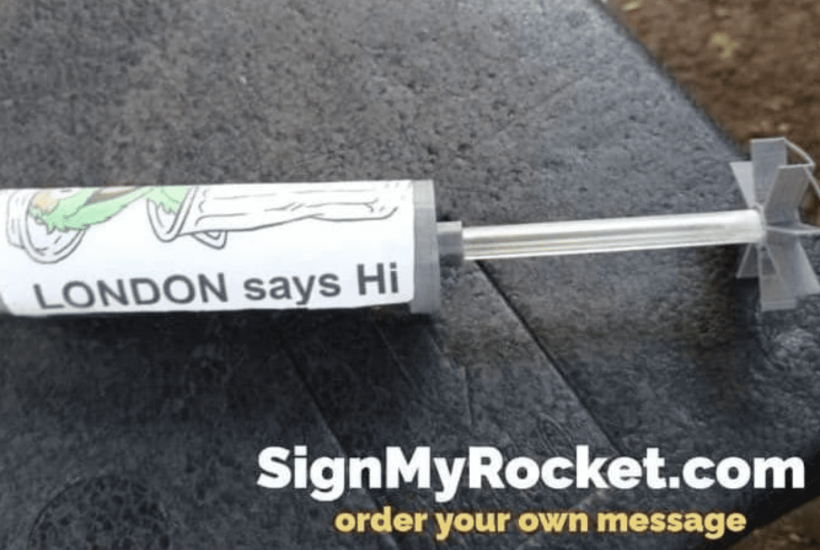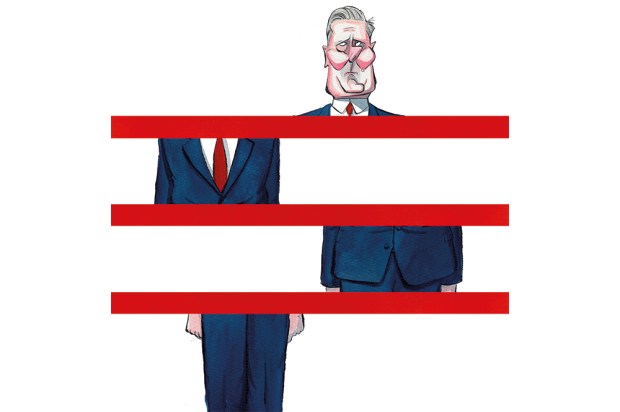Forget fund-raising concerts donating spare clothes and offering your spare room to a refugee family. There’s a better way of showing your sympathy for Ukrainians: you can now sponsor weapons, and arm it with your very own message. For up to £2,500, Brits can send a personalised message to the crowdfunding site Sign My Rocket, who will then write it on a missile destined for the Russian army.
Sending hostile messages to the enemy, of course, is not new, and may be as old as war itself. Dropping black propaganda leaflets from planes for the benefit of the enemy beneath has long been standard practice. Nor was it unusual for those on the production line at armaments factories or even those loading the ammunition to add their own special something. Soldiers and production workers are reported to have inscribed rude words and darkly humorous jibes on ammunition since the first world war.
What is different with Ukraine is that many of those sending the messages are not combatants. Brits, Americans, Canadians, Poles and Balts are among those who have joined the effort, with Americans the most enthusiastic – and they are paying for the privilege.
Some of these organisations will you a photo of the weapon, duly inscribed as per your request. Sign My Rocket started offering $30 messages on Soviet-made mortar rounds, but has massively expanded its range since it took the decision to go seriously international.
‘London says hi,’ is among the tamer slogans ordered. But if you a really wanted to push the boat out, you could try sponsoring a tank for around $2,500. The Washington Post reported that ‘Sign My Rocket’ has recently added a Buk surface-to-air missile, bearing the message ‘not for use on Malaysian Airlines” – a bleak allusion to the downing of flight MH17 in eastern Ukraine, with the loss of 298 lives.
Personalised weapon furthers Ukraine’s war effort not just by raising morale, but by providing money to buy more weapons. Prominent individuals have been doing their bit. In June, Serhiy Prytula, a Ukrainian comedian and politician, launched a campaign to buy three Turkish-made Bayraktar drones for Ukraine’s army. He raised the necessary $20m within three days, at which point the company announced that it would donate the first three for free.
It shows once again the ingenuity, enterprise and flair of the Ukrainians – as exemplified by President Zelensky, who has toured the world virtually, making his country’s case and pleading for the means to combat the enemy. It also shows up another of Russia’s failings, given that its entrepreneurial people’s war effort seems limited to merely scrawling the letter Z – the letter that has become synonymous with support for the war – on military vehicles and other available surfaces.
And yet, would we be talking about how admirable, generous and noble this aspect of Ukraine’s war effort is, if we – the West – were not on their side? Hard to imagine, I know, but what if it had been Russians crowd-funding for drones, or inscribing missiles?
Would we be happy for people to sign rockets from Iran, or from a group such as Isis? I doubt it. And if private individuals can jump in with their weapons contributions, where does that leave war as a national cause?
There’s a question of morality too. Even if the cause in Ukraine’s case is just, is it acceptable in any way for individuals to sponsor a weapon – which is by its nature destructive of livelihoods and life?
It suits everyone – governments, donors, top brass and soldiers alike – to leave sponsored weapons and personalised ammunition in an ill-defined area of unofficial, voluntary effort. To realise the perils of being too specific, you have only to recall the trouble that Liz Truss got into when she appeared to give her blessing to Britons volunteering to fight for Ukraine. That came back to bite her when some of those who did were captured by Russia’s proxy warriors in eastern Ukraine.
War is a murky business, and there are some things that may be better left unsaid. Whether that includes ‘London says hi’ inscribed on a missile intended to kill Russians, I leave to you to judge.
Got something to add? Join the discussion and comment below.
Get 10 issues for just $10
Subscribe to The Spectator Australia today for the next 10 magazine issues, plus full online access, for just $10.




















Comments
Don't miss out
Join the conversation with other Spectator Australia readers. Subscribe to leave a comment.
SUBSCRIBEAlready a subscriber? Log in